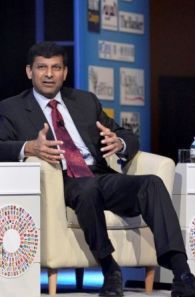Reserve Bank Governor Raghuram Rajan flayed easy monetary policy of central banks in advanced economies saying it is "more cause than medicine", while asserting that global rules require a fresh relook to ensure stable and sustainable economic growth.
 Rajan, widely acknowledged for correctly predicting 2008 financial crisis, also warned about "next leg of a wearisome cycle" unless advanced economies and emerging nations adapt to the new requirements.
Rajan, widely acknowledged for correctly predicting 2008 financial crisis, also warned about "next leg of a wearisome cycle" unless advanced economies and emerging nations adapt to the new requirements.
In his keynote address to Brookings Institution, an American think-tank, Rajan focused on unconventional monetary policies.
"A first step to prescribing the right medicine is to recognise the cause of the sickness. "Extreme monetary easing, in my view, is more cause than medicine," he said.
"The sooner we recognise that, the more sustainable the world growth we will have," he added.
He said global rules of the game need to be relooked at to ensure stable and sustainable growth and both advanced economies and emerging economies need to adapt.
"To ensure stable and sustainable growth, international rules of the game need to be revisited. Both advanced economies and emerging economies need to adapt, else I fear we are about to embark on the next leg of a wearisome cycle."
In the wake of global financial crisis in 2008, central banks like the US Federal Reserve have resorted to near zero interest rates to boost growth. The Fed had also started massive bond purchase programme to push down borrowing costs and inject liquidity, leading to capital inflows to emerging economies like India.
When the Federal Reserve last year announced gradually rolling back the bond purchase programme, there was huge capital flight out of emerging markets causing sharp decline currency value. The Indian rupee had plunged to life time low of 68 due to capital outflows in August last year.
Rajan also criticised multilateral institutions like IMF at for supporting such extremely lose monetary policies, saying "official statements by multilateral institutions such as the IMF continue to endorse unconventional monetary policies while downplaying the adverse spillover effects to other countries".
He also quoted IMF's own Jonathan Ostry and Atish Ghosh, who argued that impartial international policy assessments by multilateral entities could be suspected of bias.
"When source countries move to exit unconventional policies, some recipient countries are leveraged, imbalanced, and vulnerable to capital outflows," Rajan said.
Rajan emphasised that quantitative easing and sustained exchange intervention are in an economic equivalence class, though the channels they work through may be somewhat different.
"Our attitudes towards them should be conditioned by the size of their spillover effects rather than by any innate legitimacy of either form of intervention," he said.
He was also quick to note that there is a role for unconventional policies, that is when markets are broken or grossly dysfunctional, central bankers do have to think in innovative fashion.
Rajan said when monetary policy in large countries is extremely and unconventionally accommodative, capital flows into recipient countries tend to increase local leverage.
This is not just due to the direct effect of cross-border banking flows but also the indirect effect, as the appreciating exchange rate and rising asset prices, especially of real estate, make it seem that borrowers have more equity than they really have, he said.
"Exchange rate flexibility in recipient countries in these circumstances sometimes exacerbates booms rather than equilibrates," Rajan said.









 © 2025
© 2025